- Home
- David Gemmell
[Troy 02] - Shield of Thunder Page 2
[Troy 02] - Shield of Thunder Read online
Page 2
Nestor laughed. “How coy you are with your wife in the room. The last time I heard you brag about your skills, you said you could fart an arrow farther.”
“That, too,” Odysseus said, reddening. Penelope was relieved to see good humor restored.
On the beach the Penelope was finally fully loaded, and the crew members were straining on ropes in the effort to get the old ship refloated. The two sons of Nestor were there, both waist-deep, their backs against the timbers of the hull, pushing her out into deeper water.
The queen of Ithaka stood and brushed pebbles from her dress of yellow linen and advanced down the beach to say farewell to her king. He stood with his first mate, Bias the Black, dark-skinned and grizzled, the son of a Nubian mother and an Ithakan sire. Beside him was a massively muscled blond sailor named Leukon, who was becoming a fistfighter of some renown. Leukon and Bias bowed as she approached, then moved off.
Penelope sighed. “And here we are again, my love, as always,” she said, “making our farewells.”
“We are like the seasons,” he replied. “Ever constant in our actions.”
Reaching out, she took his hand. “And yet this time is different, my king. You know it, too. I fear you will have hard choices to make. Do not make bullheaded decisions you will regret afterward and cannot change. Do not take these men into a war, Odysseus.”
“I have no wish for war, my love.” He smiled, and she knew he meant it, but her heart was heavy with foreboding. For all his strength, his courage, and his wisdom, the man she loved had one great weakness. He was like an old warhorse, canny and cautious, but at the touch of the whip he would ride into fire. For Odysseus that whip was pride.
He kissed both of her hands then turned and stomped down the beach and into the sea. The water was chest-high before he grabbed a rope and hauled himself up on board. Instantly the rowers took up a beat, and the old ship started to glide away. She saw him wave his arm, silhouetted against the rising sun.
She had not told him of the gulls. He would only scoff. Seagulls were stupid birds, he would say. They have no place in prophecy.
But she had dreamed of a colossal flock of gulls that blotted out the sun like a black wind rising, turning the midday sky to night.
And that wind brought death and the end of worlds.
The young warrior Kalliades sat in the mouth of the cave, a dark cloak wrapped around his slim frame, his sword heavy in his hand. He scanned the arid hillside and the fields beyond. There was no one in sight. Glancing back into the gloom of the cave, he saw the injured woman lying on her side, her knees drawn up, the red cloak of Banokles covering her. She seemed to be sleeping.
Bright moonlight speared through a break in the clouds. Kalliades could see her more clearly now. Her yellow hair was long, and her pale face was bruised and swollen, smeared with drying blood.
The night breeze was cold, and Kalliades shivered. From the high cave he could see the distant sea, reflected stars glittering on the water. So far from home, he thought.
The vivid red scar on his right cheek was itching, and he idly scratched it. The last of many wounds. In the quiet of the night he remembered the battles and the skirmishes that had seen sword and dagger blades pierce his flesh. Arrows and spears had cut him. Stones shot from slings had dazed him. A blow to the left shoulder from a club had left him with a joint that ached in the winter rains. At twenty-five he was a ten-year veteran and carried the scars to prove it.
“I’m going to light a fire,” his huge comrade said, moving out of the shadows. In the moonlight Banokles’ blond hair and full beard shone like silver. Blood had spattered over his breastplate, dark spots on the bright bronze disks fastened to the heavy leather undershirt.
Kalliades turned toward the powerful warrior. “A fire will be seen,” he said quietly. “They will come for us.”
“They will come for us anyway. Might as well be now, while I’m still angry.”
“You have no reason to be angry at them,” Kalliades pointed out wearily.
“I’m not. I’m angry with you. The woman meant nothing to us.”
“I know.”
“And it’s not as if we saved her for long. There’s no way off this island. We’ll likely be dead by noon tomorrow.”
“I know that, too.”
Banokles said nothing more for a while. He moved alongside Kalliades and glared out at the night.
“I thought you were going to light a fire,” Kalliades said.
“Don’t have the patience,” Banokles grumbled, scratching at his thick beard. “Always end up cutting my fingers on the flints.” He shivered. “Cold for this time of year,” he added.
“You wouldn’t be so cold if you hadn’t covered the woman who means nothing to us with your cloak. Go and gather some dead wood. I’ll start the fire.” Kalliades moved away from the cave mouth, took some dried bark from the pouch at his side, and shredded it. Then, with smooth strokes, he struck flint stones together, sending showers of sparks into the bark. It took some time, but finally a tiny plume of smoke showed. Dropping to his belly, Kalliades blew gentle breaths over the tinder. A flame sprang up. Banokles returned, dropping a pile of sticks and branches to the ground.
“See anything?” Kalliades asked him.
“No. They’ll come after sunrise, I expect.”
The two young men sat in silence for a while, enjoying the warmth from the small fire.
“So,” Banokles said at last, “are you going to tell me why we killed four of our comrades?”
“They weren’t our comrades. We were just sailing with them.”
“You know what I mean.”
“They were going to kill her, Banokles.”
“I know that, too. I was there. What did that have to do with us?”
Kalliades did not reply, but he glanced once more at the sleeping woman.
He had first seen her only the previous day piloting a small sailboat, her fair hair gold in the sunlight and tied back from her face. She had been dressed in a white knee-length tunic with a belt embroidered with gold wire. The sun had been low in the sky, a light breeze propelling her craft toward the islands. She had seemed oblivious to the danger as the two pirate ships had closed on her. Then the first of the ships had cut across her bow. Too late she had tried to avoid capture, tugging at the sail rope, seeking to alter course and make a run for the beach. Kalliades had watched her from the deck of the second ship. There was no panic in her. But the little boat could not outrun galleys manned by skilled oarsmen.
The first ship closed in, grappling lines hurled over the side, the bronze hooks biting into the timbers of her sailboat. Several pirates clambered over the side of the ship and jumped down into her craft. The woman tried to fight them, but they overpowered her, blows raining down on her body.
“Probably a runaway,” Banokles remarked as the two of them watched the semiconscious woman being hauled to the deck of the first ship. From where they stood, on the deck of the second vessel, both men could see what followed. The crewmen gathered around her, tearing off her white tunic and ripping away the expensive belt. Kalliades turned away in disgust.
The ships had beached that night on Lion’s Head Isle, on the sea route to Kios. The woman had been dragged across the beach and into a small stand of trees by the captain of the second ship, a burly Kretan with a shaved head. She had seemed docile then, her spirit apparently broken. It had been a ruse. As the captain had raped her, she somehow had managed to pull his dagger from its sheath and rip the blade across his throat. No one had seen it, and it was some time before his body was found.
The furious crew had set off to search for her. Kalliades and Banokles had wandered away with a jug of wine. They had found a grove of olive trees and had sat quietly drinking.
“Arelos was not a happy man,” Banokles had observed. Kalliades had said nothing. Arelos was the captain of the first ship and kinsman to the man slain by the runaway. He had built a reputation for savagery and swordcraft and was fear
ed along the southern coasts. Given any other choice, Kalliades would never have sailed with him, but he and Banokles were hunted men. To stay in Mykene would have meant torture and death. The ships of Arelos had offered them a means of escape.
“You are very quiet tonight. What is bothering you?” Banokles continued as they sat in the quiet of the grove.
“We need to quit this crew,” Kalliades said. “Apart from Sekundos and maybe a couple of others, they are scum. It offends me to be in their company.”
“You want to wait until we are farther east?”
“No. We’ll leave tomorrow. Other ships will beach here. We’ll find a captain who will take us on. Then we’ll make our way to Lykia. Plenty of mercenary posts there, protecting trade caravans from bandits, escorting rich merchants.”
“I’d like to be rich,” Banokles said. “I could buy a slave girl.”
“If you were rich, you could buy a hundred slave girls.”
“Not sure I could handle a hundred. Five, maybe.” He chuckled. “Yes, five would be good. Five plump dark-haired girls. With big eyes.” Banokles drank some more, then belched. “Ah, I can feel the spirit of Dionysus seeping into my bones. I wish one of those plump girls was here now.”
Kalliades laughed. “Your mind is always occupied by either drink or sex. Does nothing else interest you?”
“Food. A good meal, a jug of wine, followed by a plump woman squealing beneath me.”
“With your weight on her, no wonder she’d be squealing.”
Banokles laughed. “That’s not why they squeal. Women adore me because I am handsome and strong and hung like a horse.”
“You neglect to mention that you always pay them.”
“Of course I pay them. Just as I pay for my wine and my food. What point are you trying to make?”
“Obviously a poor one.”
Around midnight, as they were preparing to sleep, they heard shouts. Then the woman staggered into the grove, chased by five crewmen. Already weak from the ugly events of the day, she stumbled, falling to the ground close to where Kalliades was sitting. Her white tunic was ripped and filthy and stained with blood. A crewman named Baros ran in, a wickedly curved knife in his hand. He was lean and tall with close-set dark eyes. He liked to be called Baros the Killer. “I’m going to gut you like a fish,” he snarled.
She looked up at Kalliades then, her face pale in the moonlight, her expression one of exhausted desperation and fear. It was an expression he had seen before, one that had haunted him since childhood. The memory speared through him, and he saw again the flames and heard the pitiful screams.
Surging to his feet, he stood between the man and his victim. “Put the knife away,” he ordered.
The move surprised the crewman. “She’s for death,” he said. “Arelos ordered it.” He stepped toward Kalliades. “Do not seek to come between me and my prey. I have slain men from every land around the Great Green. You want your blood spilled here, your guts laid out on the grass?”
Kalliades’ short sword hissed from its scabbard. “There is no need for anyone to die,” he said softly. “But I’ll not allow the woman to be hurt further.”
Baros shook his head. “I told Arelos he should have cut your throats and taken your armor. You just can’t trust a Mykene.” He sheathed his knife and stepped back, drawing his sword. “Now you are in for a lesson. I have fought more duels than any man of the crew.”
“It is not a large crew,” Kalliades pointed out.
Baros leaped forward with surprising speed. Kalliades parried the thrust, then stepped in, hammering his elbow into the man’s face. Baros fell back. “Kill him!” he screamed. The other four surged forward. Kalliades killed the first, and drunken Banokles hurled himself at the others. Baros darted in again, but this time Kalliades was ready. He blocked the thrust, rolled his wrist, and sent a riposte that opened Baros’ throat. Banokles had killed one man and was grappling with another. Kalliades ran to his aid just as the fifth man slashed his sword toward Banokles’ face. Banokles saw the blow coming and swung the man he was fighting to meet it. The blade cleared his assailant’s neck.
As Kalliades charged in, the surviving crewman turned and ran away into the night.
Sitting now beside the crackling fire in the cave, he glanced at Banokles. “I am sorry to have brought you to this, my friend. You deserved better.”
Banokles took a deep breath, then let it out slowly. “You are a strange one, Kalliades,” he said, shaking his head. “But life with you is never dull.” He yawned. “If I am going to kill sixty men tomorrow, I’ll need some rest.”
“They won’t all come. Some will be left with the ships. Others will be whoring. Probably no more than ten or fifteen.”
“Oh, I’ll rest easier knowing that.” Loosening the straps of his battered breastplate, Banokles lifted it clear and dropped it to the ground. “Never could sleep properly in armor,” he said, then stretched himself out beside the fire. Within moments his breathing had deepened.
Kalliades added wood to the fire, then returned to the cave mouth. A cool breeze was blowing, and the sky was ablaze with stars. Banokles was right: There was no way off the island, and tomorrow the pirate crew would come hunting them. He sat lost in thought for some time, then heard a stealthy movement behind him. Rising swiftly, he turned to see the blood-smeared woman advancing on him, a fist-sized stone in her hand. Her bright blue eyes shone with hatred.
“You won’t need that,” he said, backing away. “You are in no danger tonight.”
“You lie!” she said, her voice harsh, trembling with anger. Kalliades drew his dagger and saw her tense. Casually he tossed the blade to the floor at her feet.
“I do not lie. Take the weapon. Tomorrow you will need it, for they will be coming for us.”
The woman crouched and tried to pick up the fallen dagger. But she lost her balance and half fell. Kalliades remained where he was. “You need to rest,” he said.
“I remember you now,” she told him. “You and your friend fought the men who were attacking me. Why?”
“Oh, Great Zeus, let him answer that question,” Banokles said sleepily from his place by the fire. Sweeping up the dagger, the woman tried to turn to face him but stumbled again.
“Blows to the head can do that,” Banokles said, getting up and wandering over to join them. “You should sit down.”
She stared hard at Kalliades. “I saw you from my boat,” she said. “You were on the second ship. You saw them cut across my bows and throw grappling lines. You watched as they dragged me aboard.”
“Yes. We were sailing with them.”
“You are pirates.”
“We are what we are,” Kalliades conceded.
“I was to be passed to your ship tomorrow. They told me that while they were raping me.”
“It is not my ship. I did not give the order to attack you. Nor did I or my comrade take part in what followed. No man could blame you for your anger, but do not direct it at the men who saved you.”
“Now let us hope someone saves us,” Banokles added.
“What do you mean?” the woman demanded.
“We are on a small island,” Banokles replied. “We have no gold and no ship. Angry men will come looking for us tomorrow. Now, we are great warriors, Kalliades and I. None better. Well… not now that Argurios is dead. Between us I reckon we could survive against seven or eight warriors. There are around sixty fighting men in the pirate crews. And not one soft-bellied puker among them.”
“You have no plan of escape?”
“Oh, I do not make plans, woman. I drink, I whore, I fight. Kalliades makes plans.”
“Then you are both fools,” she said. “You have brought about your doom.”
“Where I come from slaves are respectful,” Banokles said, an edge of anger in his voice.
“I am no man’s slave!”
“Have the blows to your head knocked all sense from you? Your craft was taken at sea. It carried no banner and no saf
e conduct. You were captured, and now the pirates own you. Therefore, you are a slave according to the laws of gods and men.”
“Then I piss on the laws of gods and men!”
“Be calm, both of you!” Kalliades ordered. “Where were you sailing to?” he asked her.
“I was heading for Kios.”
“You have family there?”
“No. I had some wealth on the boat, gems and trinkets of gold. I was hoping to find passage on a ship to Troy. The pirates took everything. And more.” She rubbed at her face, scrubbing away at the dried blood.
“There is a stream over there,” Kalliades said. “You could wash your face.”
The woman hesitated. “Then I am not your prisoner?” she asked at last.
“No. You are free to do as you please.”
She stared hard at Kalliades, then at Banokles. “And you did not help me in order to make me your slave or to sell me to others?”
“No,” Kalliades told her.
She seemed to relax then but continued to hold the dagger in a tight fist. “If what you say is true, I should… thank you both,” she said, struggling with the words.
“Oh, don’t thank me,” Banokles said. “I would have let you die.”
CHAPTER TWO
THE SWORD OF ARGURIOS
Kalliades dozed for a while in the cave mouth, his head resting against the rock wall. Banokles was snoring loudly and occasionally muttering in his sleep.
In the predawn Kalliades left the cave and walked to the stream. Kneeling by the bank, he splashed his face, then ran his wet fingers through his close-cropped black hair.
He saw the woman leave the cave. She, too, wandered down to the stream. Tall and slender, she walked with her head high, her movements graceful, like a Kretan dancer. She was not a runaway slave, Kalliades knew. Slaves learned to walk with their heads down, their posture submissive. He did not speak but watched her as she washed the dried blood from her face and arms. Her face was still swollen, and there were bruises around her eyes. Even without the swelling she would not be pretty, he thought. Her face was strong and angular, her brows thick, her nose too prominent. It was a stern face and one that he guessed was a stranger to laughter even in better times.

 Bloodstone
Bloodstone White Wolf
White Wolf Wolf in Shadow
Wolf in Shadow Last Sword of Power
Last Sword of Power Dark Moon
Dark Moon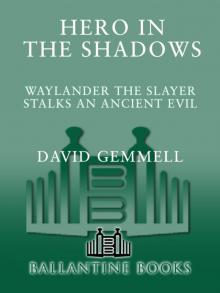 Hero in the Shadows
Hero in the Shadows Gemmell, David - Drenai 09 - Hero In The Shadows
Gemmell, David - Drenai 09 - Hero In The Shadows Waylander
Waylander Shield of Thunder
Shield of Thunder Stormrider Stormrider
Stormrider Stormrider Ghost King
Ghost King Legend
Legend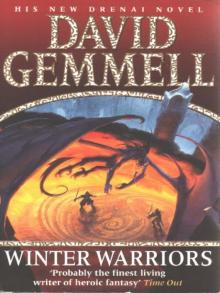 Winter Warriors
Winter Warriors Fall of Kings
Fall of Kings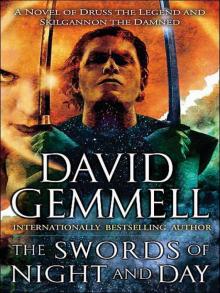 The Swords of Night and Day
The Swords of Night and Day The King Beyond the Gate
The King Beyond the Gate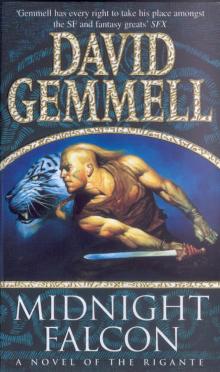 Midnight Falcon
Midnight Falcon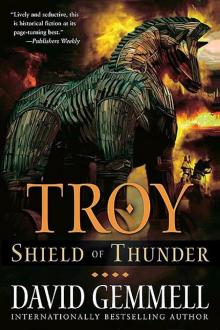 02 - Shield of Thunder
02 - Shield of Thunder In the Realm of the Wolf
In the Realm of the Wolf Ravenheart
Ravenheart The First Chronicles of Druss the Legend
The First Chronicles of Druss the Legend Last Guardian
Last Guardian Stormrider
Stormrider The Hawk Eternal
The Hawk Eternal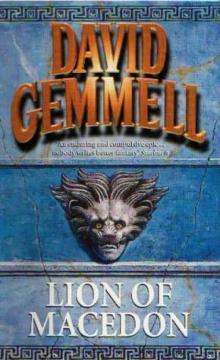 Lion of Macedon
Lion of Macedon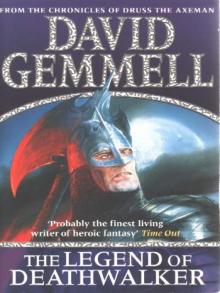 The Legend of Deathwalker
The Legend of Deathwalker Knights of Dark Renown
Knights of Dark Renown Echoes of the Great Song
Echoes of the Great Song Lord of the Silver Bow
Lord of the Silver Bow Quest for Lost Heroes
Quest for Lost Heroes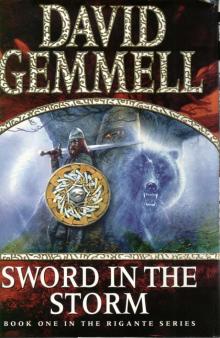 Sword in the Storm
Sword in the Storm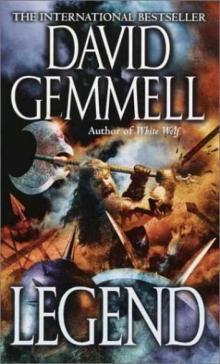 Drenai Saga 01 - Legend
Drenai Saga 01 - Legend White Knight/Black Swan
White Knight/Black Swan![[Troy 02] - Shield of Thunder Read online](http://i1.bookreadfree.com/i/03/19/troy_02_-_shield_of_thunder_preview.jpg) [Troy 02] - Shield of Thunder
[Troy 02] - Shield of Thunder Lord of the Silver Bow t-1
Lord of the Silver Bow t-1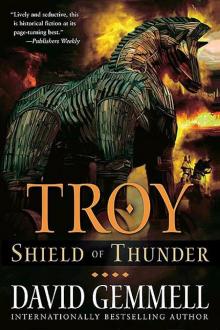 Shield of Thunder t-2
Shield of Thunder t-2 White Wolf: A Novel of Druss the Legend dt-10
White Wolf: A Novel of Druss the Legend dt-10 Drenai Saga 02 - The King Beyond the Gate
Drenai Saga 02 - The King Beyond the Gate Ironhand's Daughter
Ironhand's Daughter Gemmell, David - Drenai 06 - The First Chronicles of Druss the Legend
Gemmell, David - Drenai 06 - The First Chronicles of Druss the Legend The Last Guardian
The Last Guardian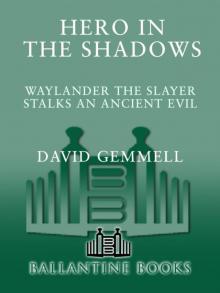 Hero in the Shadows: A Waylander the Slayer Novel
Hero in the Shadows: A Waylander the Slayer Novel The Legend of the Deathwalker
The Legend of the Deathwalker